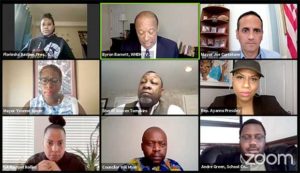
Regional and community leaders spoke during a panel on structural racism on June 23. ~ Photo courtesy of the City of Somerville
By Shira Laucharoen
The City of Somerville hosted a panel discussion on structural racism on June 23, addressing the question of “where do we go from here, and how can everyone be an ally?” Speakers at the talk included congresswoman Ayanna Pressley, D.A. Rachael Rollins, and Somerville Mayor Joe Curtatone.
The meeting, moderated by WHDH TV 7 News reporter Byron Barnett, focused on how racism impacts health, public safety, education, jobs, housing and other aspects of society and community.
“The fights are not new, but this is a new moment,” said Pressley. “I am so inspired by the young people who are at the fore of what is a multigenerational, multiracial movement and by those who have in the past been allies, who seek to be accomplices in being anti-racist and dismantling structural racism. What do we mean when we say structural racism? How I define it is hate, hurt, and harm that has been legislated and codified by law and is so pervasive, it is so systemic, that you cannot escape it. This is a reckoning.”
Speakers discussed why there is a need to change the criminal justice system, with Pressley calling for “a radical reimagining of our criminal legal system, but of our nation.” Pressley questioned why police officers are in roles that would be more appropriately filled by other specialists. She challenged the idea of police being called to schools, when social and emotional wellness social workers could handle those cases. Mental health clinicians could be deployed to help those with mental illnesses, rather than officers.
Suffolk County sheriff Steven Tompkins said that problems with the justice system have existed for a long time, with their origins in the enslavement of black people. “When people say the criminal justice system is broken, the criminal justice system isn’t broken. The criminal justice system was built to be punitive and oppressive,” said Tompkins. “When the power structure acts the way it does, it’s because they still see us as their property.”
Panelists addressed how structural racism has permeated all facets of culture and life. Somerville School Committee member Andre Green spoke to how it impacts the education system, with the history of black people not being regularly taught in schools.
Discrimination in housing continues to affect African Americans, said councilor Will Mbah, citing redlining as a problem that traces back to the 1950’s. The spread of the coronavirus has revealed how broken the health system is, said Mbah.
Meanwhile, mayor of Framingham Yvonne Spicer addressed the need of holding police officers accountable for misconduct, describing the problem of qualified immunity, a legal doctrine that shields officers from civilian lawsuits.
The discussion also shed light on the hope panelists have for the future of the movement. Somerville High School Black Student Union president Floreisha Bastien said that for young people taking a stand, silence is not an option.
Curtatone recently became the first mayor in Massachusetts to declare racism a public health and safety emergency, explaining how the impact of pollution and access to health care are often determined by the race of communities. He concluded by saying that the voices of youth demanding change are ones that we need in the fight against racism.
“We need your ideals,” said Curtatone. “White America is uncomfortable right now. We should be made to be uncomfortable. If we’re really going to be a country that is compassionate, that is civil, diverse, that is equally opportunistic for everyone, no matter what their race is, we need to question our own personal prejudices and our own problematic beliefs. We will be a great nation when that happens.”














Reader Comments